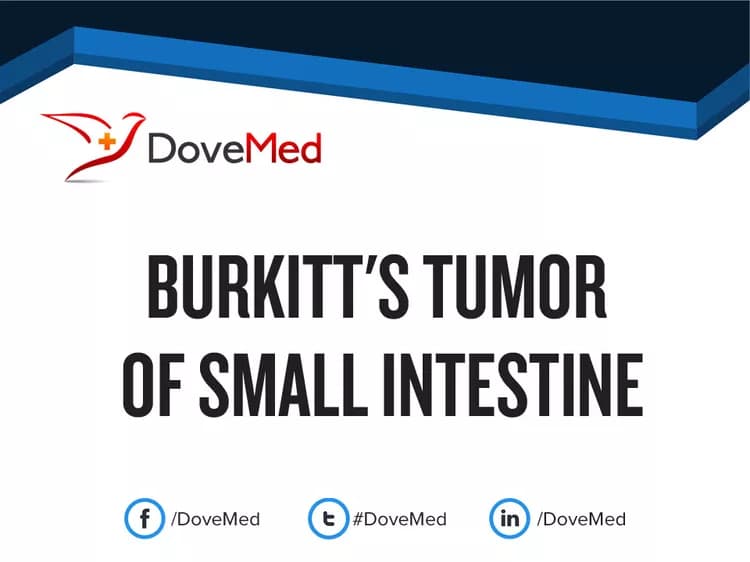The topic Burkitt's Tumor of Small Intestine you are seeking is a synonym, or alternative name, or is closely related to the medical condition Burkitt Lymphoma of Small Intestine.
Quick Summary:
- Burkitt lymphoma (BL) is a very aggressive and fast-growing form of non-Hodgkin lymphoma. The lymphoma affects the B-cells of the immune system
- Burkitt Lymphoma of Small Intestine can affect any portion of the small bowel, but typically involves the ileum. It is a rare type of gastrointestinal lymphoma that is seen in children and adolescents. However, it is the most common cancer type involving the small intestine in children
- Burkitt’s lymphoma affecting the small intestine may be of the following types:
- Endemic Burkitt Lymphoma of Small Intestine: This type of lymphoma is common wherever Burkitt lymphoma is endemic in Africa. It is generally associated with Epstein-Barr virus (EBV)
- Sporadic Burkitt Lymphoma of Small Intestine: This type is similar to the endemic form of Burkitt lymphoma, but occurs in other parts of the world (outside Africa). It is more infrequent and is generally not associated with EBV infection
- No specific risk factors for this lymphoma type have been identified. But, Small Bowel Burkitt Lymphoma can occur in a background of HIV infection. The specific cause of the condition is currently unknown. Nevertheless, certain genetic defects have been implicated, particularly in the c-MYC gene
- Burkitt Lymphoma of Small Intestine may cause abdominal pain, diarrhea, and gastrointestinal tract bleeding. There may be general symptoms such as fatigue, weight loss, and frequent infections. A diagnosis is typically made with the biopsy of the affected lymph node or tumor tissue
- Burkitt lymphoma is generally treated with chemotherapy supplemented with monoclonal antibody treatment. The standard of care is intensive chemotherapy; but, a new clinical study has determined that low-intensity chemotherapy may be effective in some cases. This provides the added benefit of less toxicity
- Burkitt Lymphoma of Small Intestine is a high-grade malignancy. The prognosis of the condition is dependent upon a set of factors, most importantly the stage of the cancer. The prognosis is generally guarded
General information on lymphoma and lymphocytes:
- Lymphoma is a type of cancer stemming from uncontrollably dividing lymphocytes (type of white blood cells). There are two types of lymphomas:
- Hodgkin lymphoma
- Non-Hodgkin lymphoma
- Lymphocytes are the main white blood cells found in the lymph, which is the fluid of the lymphatic system; just as blood is the fluid of the circulatory system
- Lymphocytes are made in bone marrow, and can develop into either B-cells or T-cells. Gastrointestinal Follicular Lymphoma arises from cancerous B-cells
- Lymph results from filtration of blood as it travels to and from tissues. Lymph is colorless because it lacks red blood cells; instead, it contains lymphocytes. It is central to the immune system
- There are 3 different kinds of lymphocytes:
- T-lymphocytes or T cells: They help combat infections and abnormalities within the cells (cell-mediated immunity). They fight viruses and cancerous cells
- B-lymphocytes or B cells: They produce antibodies that are bodily defense proteins, which target foreign invaders outside the cells (humoral immunity). They fight bacterial cells, cell fragments, and other immunogenic elements
- Natural killer cells or NK cells: They perform diverse functions related to both cell-mediated and humoral immunity. They also scout for cancer cells, a process called immune surveillance
Please find comprehensive information on Burkitt Lymphoma of Small Intestine regarding definition, distribution, risk factors, causes, signs & symptoms, diagnosis, complications, treatment, prevention, prognosis, and additional useful information HERE.
Related Articles
Test Your Knowledge
Asked by users
Related Centers
Related Specialties
Related Physicians
Related Procedures
Related Resources
Join DoveHubs
and connect with fellow professionals


0 Comments
Please log in to post a comment.